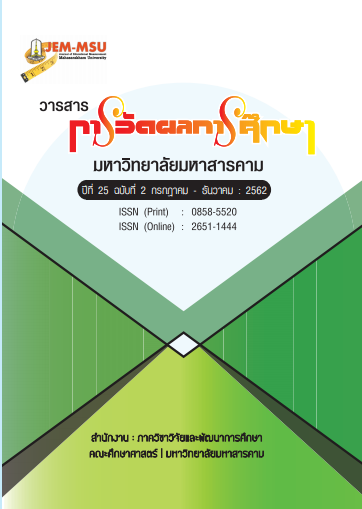Development of a Program to Promote Agricultural Working Skills Based on the Philosophy of Sufficiency Economy for Grade 7 Students
Main Article Content
Abstract
The purposes of this research were to develop a program for agricultural working skills promotion with the Philosophy of Sufficiency Economy, and to try out the program for agricultural working skills promotion with the Philosophy of Sufficiency Economy in order to study its results by comparing the grade 7 students’ agricultural working skills with the preset criterion, and comparing the sufficiency characteristics before joining the program with the sufficiency characteristics after joining the program. The sample of this research consisted of 33 grade 7 students, obtained through cluster random sampling. The subjects took part in the activities for 10 times. The tools of this research comprised: 1) The program for agricultural working skills promotion with the Philosophy of Sufficiency Economy; 2) The evaluation form for agricultural working skills, having the item discrimination between 0.49 and 0.99 and the total reliability of 0.89. The statistics employed in the analysis of data comprised the mean, standard deviation, and t-test (one sample and dependent samples).
The results were as follows:
The program for agricultural working skills promotion with the Philosophy of Sufficiency Economy that had been developed comprised 10 activities which helped promote knowledge and understanding of agricultural working skills and the attributes of Sufficiency (modesty, rationality, good immunity). This program emphasized the student’s training on planning, using the equipment, and hands-on experience in order to gain the agricultural working skills. The program for agricultural working skills promotion with the Philosophy of Sufficiency Economy for grade 7 students had content validity and when it was evaluated by 5 experts it was found that the program was in the most appropriate level.
The students who took part in the program for agricultural working skills promotion with the Philosophy of Sufficiency Economy for grade 7 students had the posttest scores higher than the 80 percent preset score, with statistical significance at the .05 level.
The students who took part in the program for agricultural working skills promotion with the Philosophy of Sufficiency Economy for grade 7 students had the posttest scores of the 3 Sufficiency attributes which were modesty, rationality, and good immunity higher than before taking part in the program, with statistical significance at the .05 level.
Article Details
The content and information contained in the published article in the Journal of Educational Measurement Mahasarakham University represent the opinions and responsibilities of the authors directly. The editorial board of the journal is not necessarily in agreement with or responsible for any of the content.
The articles, data, content, images, etc. that have been published in the Journal of Educational Measurement Mahasarakham University are copyrighted by the journal. If any individual or organization wishes to reproduce or perform any actions involving the entirety or any part of the content, they must obtain written permission from the Journal of Educational Measurement Mahasarakham University.
References
ชัยยศ เดชสุระ. (2558). การพัฒนาโปรแกรมโดยการน้อมนำหลักปรัชญาของเศรษฐกิจพอเพียงและหลักพุทธธรรมไตรสิกขา เพื่อสร้างเสริมจิตสาธารณะนักศึกษาปริญญาบัณฑิต. จุฬาลงกรณ์มหาวิทยาลัย.
ณัฐพล โยธา. (2557). การพัฒนาโปรแกรมฝึกวินัยในตนเองด้วยทฤษฎีจริยธรรมสาหรับนักเรียน ชั้น ประถมศึกษาปีที่ 5. มหาวิทยาลัยมหาสารคาม.
ถวัลย์ มาศจรัส. (2550). ปทานุกรมหลักสูตรการศึกษาขั้นพื้นฐาน พุทธศักราช 2544 (ฉบับสมบูรณ์ฉบับแรกของประเทศไทย). กรุงเทพฯ: ธารอักษร.
ธิดาวัลย์ อุ่นกอง. (2558). การนำหลักปรัชญาของเศรษฐกิจพอเพียงสู่การปฏิบัติ โรงเรียนบ้านห้วยไร่ อำเภอดอยหลวง จังหวัดเชียงราย. มหาวิทยาลัยเวสเทิร์น
นฤมล มณีงาม. (2547). การพัฒนาโปรแกรมสร้างจิตสำนึกเกี่ยวกับการประหยัดพลังงาน ตามหลักการเรียนรู้ ด้วยการรับใช้สังคม สำหรับนักเรียนชั้นประถมศึกษาปีที่ 6. วิทยานิพนธ์ปริญญามหาบัณฑิต จุฬาลงกรณ์มหาวิทยาลัย.
มาลินี จุฑะรพ. (2539). จิตวิทยาการเรียนการสอน. กรุงเทพฯ: อักษราพิพัฒน์.
ศุภกร เกษกล้า. (2544). การพัฒนาโปรแกรมการเรียนการสอนโดยใช้การเรียนการสอนแบบโครงงานผ่าน ระบบเครือข่ายอินเทอร์เน็ต เรื่องปัญหาสิ่งแวดล้อมสำหรับนักเรียนชั้นประถมศึกษาปีที่ 6 โรงเรียนสังกัดสำนักงานคณะกรรมการการศึกษาเอกชน. จุฬาลงกรณ์มหาวิทยาลัย.
สุดาเรศ แจ่มเดชะศักดิ์. (2543). การพัฒนาโปรแกรมสิ่งแวดล้อมศึกษาสำหรับเด็กวัยอนุบาลโดยใช้แนวการสอนแบบผูกเป็นเรื่องราว. จุฬาลงกรณ์มหาวิทยาลัย.
นัจรีภรณ์ สิมมารุณ. (2559). การพัฒนาโปรแกรมสร้างเสริมทักษะกระบวนการทางวิทยาศาสตร์ขั้นบูรณาการ ความสามารถในการวิเคราะห์ และจิตวิทยาศาสตร์ของนักเรียนชั้นมัธยมศึกษาปี ที่ 4 โดยบูรณาการการประเมินตามสภาพจริง:การวิจัยผสานวิธี. มหาวิทยาลัยมหาสารคาม.
ภูษณิศา นวลสกุล. (2550). การประเมินหลักสูตรวิทยาศาสตรบัณฑิต (เกษตรศาสตร์) หลักสูตร ปรับปรุง พ.ศ. 2535. มหาวิทยาลัยอุบลราชธานี.
โรงเรียนคำชะอีวิทยาคาร. (2559). รายงานประจำปีของสถานศึกษา. มุกดาหาร
สุจิตดา ขุนคา. (2553). การจัดการเรียนรู้เพื่อพัฒนาทักษะการปฏิบัติงานรายวิชาการงานอาชีพและเทคโนโลยี งานธุรกิจ ชั้นมัธยมศึกษาปีที่ 3 โรงเรียนแม่แตง จังหวัดเชียงใหม่. มหาวิทยาลัยเชียงใหม่
สำนักวิชาการและมาตรฐานการศึกษา. (2549). เอกสารแนวทางการดำเนินงานปฏิรูปการเรียนการสอนตาม เจตนารมณ์กระทรวงศึกษาธิการ “2549 ปีแห่งการปฏิรูปการเรียนการสอน” แนวทางการบริหาร หลักสูตรและการเรียนการสอน ตามหลักสูตรการศึกษาขั้นพื้นฐาน พุธศักราช 2544. กรุงเทพฯ : กระทรวงฯ.
อำพร สะดวก. (2559). รูปแบบการพัฒนาทักษะกระบวนการทำงานเกษตร เรื่อง การปลูกพืช วิชาการงาน อาชีพและเทคโนโลยี (งานเกษตร) โดยใช้ศูนย์การเรียนรู้เกษตรมีชีวิตเป็นฐาน สำหรับนักเรียนชั้น มัธยมศึกษาปีที่ 3 โรงเรียนไพรบึงวิทยาคม. ศรีสะเกษ
อัญญรัตน์ นาเมือง. (2556). การพัฒนารูปแบบการจัดการเรียนรู้เพื่อการเรียนการสอนหลักปรัชญาของเศรษฐกิจพอเพียงสำหรับนักเรียนชั้นประถมศึกษา. มหาวิทยาลัยนราธิวาสราชนครินทร์


